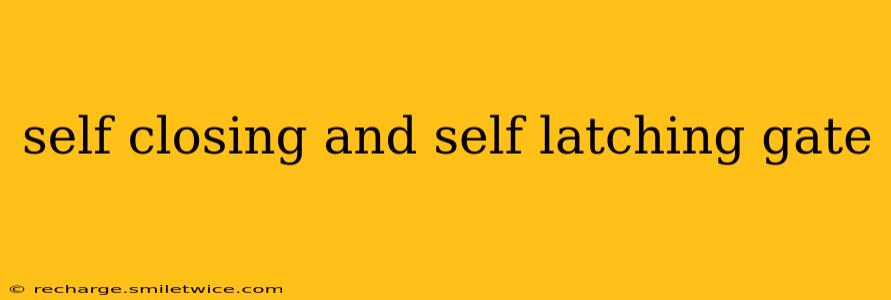Choosing the right gate for your property is crucial for safety and security. Self-closing and self-latching gates offer superior protection compared to standard gates, automatically ensuring they're always securely shut. This comprehensive guide will delve into the differences, benefits, and considerations when selecting these important safety features for your home or business.
What is a Self-Closing Gate?
A self-closing gate is designed to automatically close after it's opened. This crucial feature eliminates the risk of leaving the gate ajar, enhancing security and preventing accidental access. The closing mechanism can vary, employing springs, hinges, or hydraulic dampeners, ensuring a smooth, controlled closure without slamming. This prevents damage to the gate itself and reduces noise.
What is a Self-Latching Gate?
A self-latching gate automatically secures itself closed once it reaches its closed position. The latching mechanism engages automatically, preventing unauthorized entry. This feature complements the self-closing function, providing a double layer of security. Different latching mechanisms exist, from simple spring-loaded latches to more sophisticated magnetic or electronic locking systems.
What are the Benefits of Self-Closing and Self-Latching Gates?
The combined benefits of self-closing and self-latching gates significantly enhance safety and security:
- Enhanced Security: The automatic closing and latching prevent unauthorized access, deterring intruders and keeping your property secure.
- Improved Child Safety: Self-closing and self-latching gates are essential for preventing young children from wandering off unsupervised or gaining access to hazardous areas.
- Increased Convenience: No need to remember to close and latch the gate manually, saving time and effort.
- Reduced Risk of Accidents: Automatically closing gates eliminate the risk of the gate being left open, preventing accidental injuries or property damage.
- Improved Pet Containment: Keeps pets safely contained within your property.
What Types of Self-Closing and Self-Latching Mechanisms Exist?
Several mechanisms achieve self-closing and self-latching functions:
- Spring-loaded Hinges: These hinges incorporate a spring mechanism that automatically pulls the gate closed. They are generally cost-effective but might require adjustments over time.
- Hydraulic Dampeners: These provide a smoother, controlled closing action, preventing slamming. They are often more durable and require less maintenance.
- Magnetic Latches: These latches use magnets to secure the gate closed, offering a quiet and reliable closing mechanism.
- Electronic Locking Systems: These offer the highest level of security, often integrated with access control systems, allowing for remote locking and unlocking.
How Much Do Self-Closing and Self-Latching Gates Cost?
The cost of self-closing and self-latching gates varies significantly depending on several factors:
- Gate Material: Wood, metal, and vinyl gates each have different price points.
- Size and Style: Larger and more ornate gates will naturally cost more.
- Mechanism Type: The complexity of the self-closing and self-latching mechanism affects the overall cost. Electronic systems tend to be more expensive than spring-loaded options.
- Installation Costs: Professional installation adds to the total cost.
It's best to obtain quotes from several gate installers to get an accurate estimate for your specific needs.
Are Self-Closing and Self-Latching Gates Required by Law?
Building codes and regulations often mandate self-closing and self-latching gates in specific situations, particularly for pools, potentially hazardous areas, and in certain commercial settings. Check your local building codes and regulations for specific requirements.
How Do I Choose the Right Self-Closing and Self-Latching Gate?
Consider these factors when choosing a gate:
- Your Specific Needs: Determine the level of security and safety required based on your property and its intended use.
- Gate Material: Select a material that is durable, weather-resistant, and aesthetically pleasing.
- Mechanism Type: Choose a mechanism that meets your needs and budget, considering factors like durability and maintenance requirements.
- Professional Installation: Ensure professional installation to guarantee proper functionality and safety.
By carefully considering these factors, you can choose a self-closing and self-latching gate that provides optimal safety and security for your property. Remember to check local regulations and consult with professionals for guidance on the best options for your specific situation.
